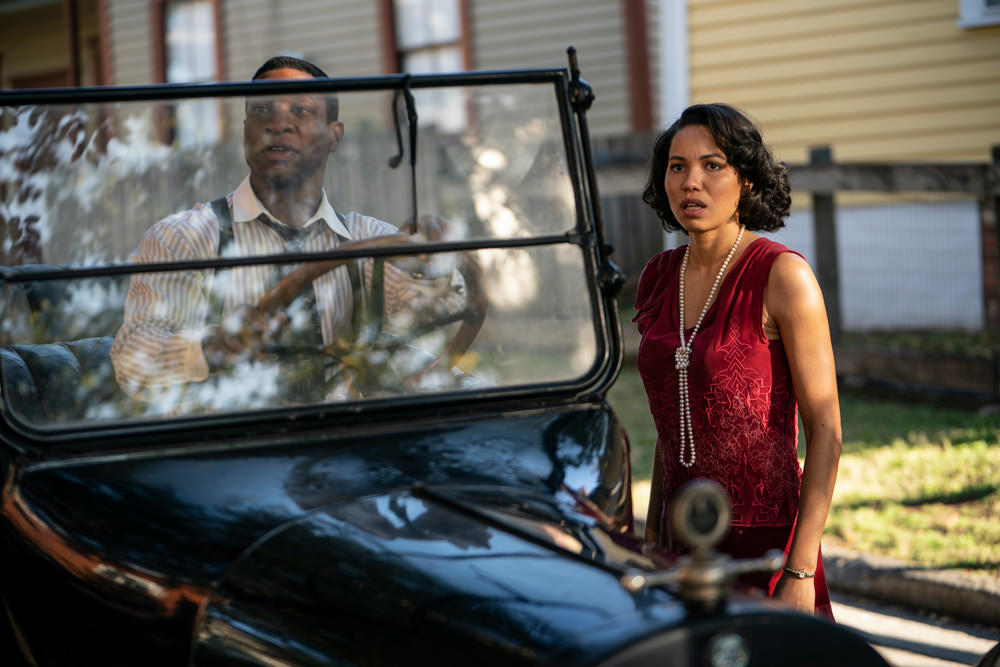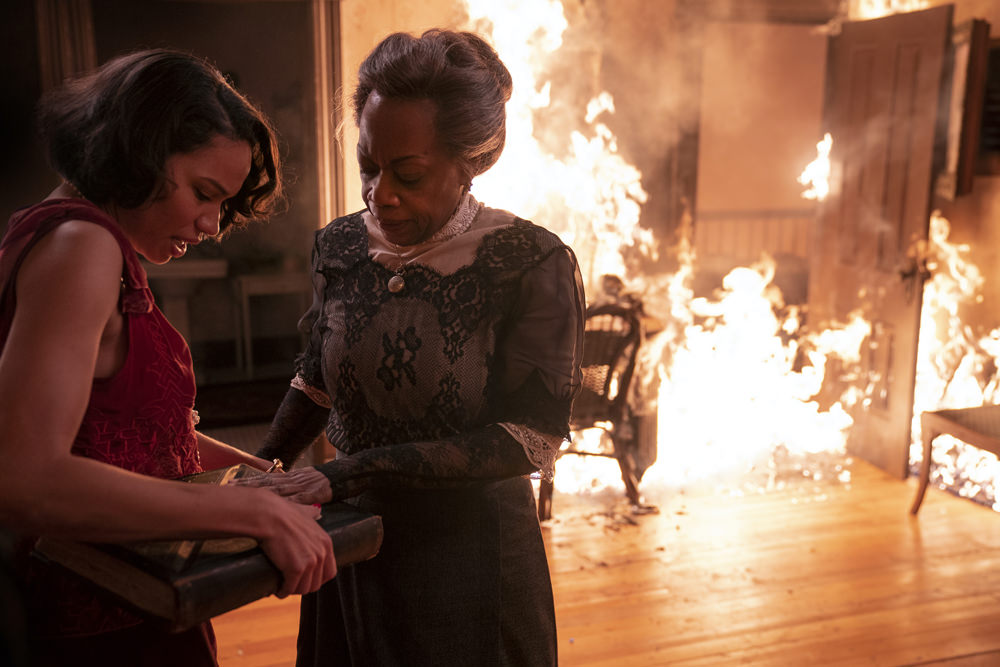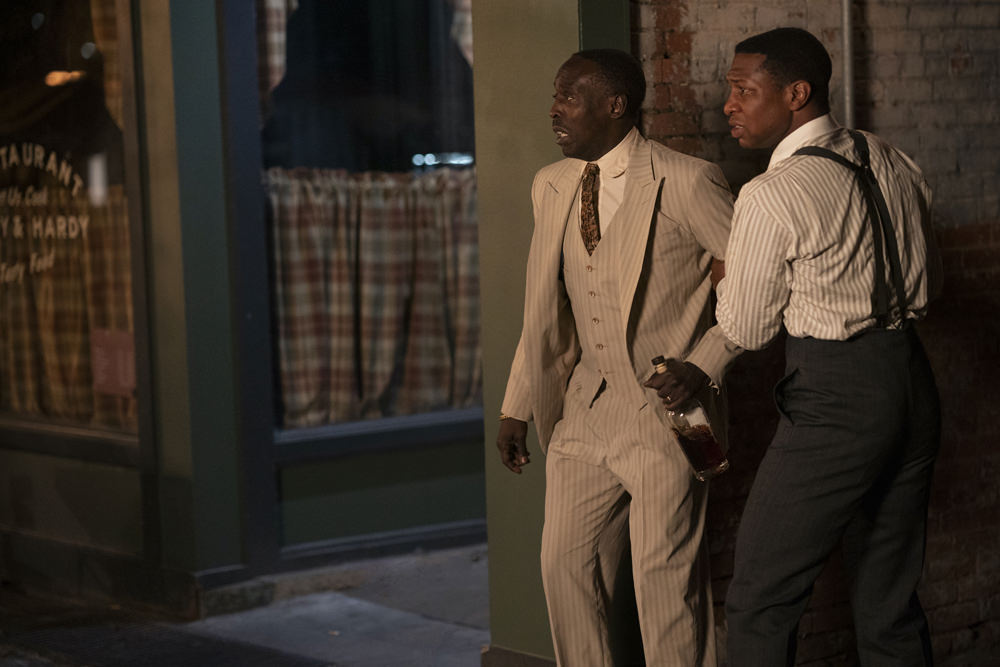
The strands and threads of the story are finally weaving together and in doing so, Lovecraft Country is revealing itself to be more than a little strained from the weight of bearing its central conceit and trying to weave together all the competing agendas and character arcs in a way that makes sense. As much as we’ve enjoyed this season, we’re ready for it to wrap itself up because it’s right on the verge of collapsing.
Which isn’t to say that this was a bad episode in any way. In fact, side trip into dark moments in history aside, it was pretty exhilarating to see the now-super-powered team of adventurers (Tic’s got a pet Shoggoth bodyguard, Leti’s invulnerable, Ruby’s essentially a shape-shifter and Hippolyta is not fully human anymore) come together; just as it was a relief to have so many character arcs and plot threads intertwine and get addressed. Everyone is on the same page and most of the secrets weighing each of the characters down have been addressed in some way. But there’s a pattern of characters withholding information for not particularly well-explained reasons, followed by the reveal of the secret, followed by yet another angry shouting match, followed by… the story just moving forward.
Ruby is staking her safety and freedom to live her life on the largess of a literal white witch who not only manipulated her, lied to her, and sexually assaulted her, but has made it perfectly clear she intends to kill the father of her sister’s baby. It just doesn’t scan, no matter how much they try to make it, no matter how good Wunmi Mosaku is, Ruby Baptiste is a character whose arc makes no sense at all. It probably wouldn’t matter, except for Mosaku’s star-making turn in the role (we gasp a little every time she gets a closeup; not just because she’s beautiful, but she’s got charisma shooting out of her pores) and the fact that so much of the story hinges on Ruby being so inexplicable.

Then again, none of the other characters are making much sense either. Leti’s reason for essentially fucking Tic over by giving Christina the negatives of the spell pages is sort of explained by her pregnancy but not in a way that feels fleshed out or examined. Why did she give her lover’s enemy the one thing she needs to destroy him? Because she’s pregnant. That’s the only answer. And if that’s meant to underline the selfishness other characters have mentioned, then it would be good to examine that instead of cutting it off. Similarly, Montrose keeps dropping these bombs on Tic that cause him to question his entire life, they fight, and then they just… stop fighting. There’s never any resolution or sense that anything has been dealt with. Characters just keep moving forward. Bear in mind that Montrose murdered someone a couple of episodes back and everyone seems to have just decided it doesn’t matter because he had a terrible childhood.
Having said that, the themes of generational Black trauma and the centering of African-American history and Black culture are what tend to drive the series toward its best moments. This episode’s focus on the Tulsa Massacre of 1921 was appropriately heart-wrenching and sobering, with each of the characters involved getting some amazing moments to shine, from Leti literally walking through the flames of history after begging one of her forebears to give her hope for the future (shoutout to the amazing Regina Taylor, who played Tic’s great-grandmother and delivered one of the most amazing lines of the series with true power: “When my great great grandson is born, he will be my faith turned flesh.”) to Montrose coming face-to-face with the roots of all his pain and shame, to Tic coming to an understanding of how trauma warps a life and echoes down through the generations, all of the parts of this episode that worked the best were the parts that eschewed all the agendas, secrets and arguing to focus on the series’ true themes of family, pain, and the inescapable past we all carry with us in one way or another.

Yes, we wish the character arcs made just a little more sense and we still think the series has an odd relationship with queerness and gender. For instance, it’s still unclear whether Ruby (and by extension, the show) sees her relationship with Christina as a queer one (she’s done no work in unpacking or explaining her feelings and attraction for her) and we’re not convinced the revisiting of the Tulsa Massacre was the right time and place for a story about Montrose’s first love. The event itself is so loaded with horror and shame that adding a queer element to it felt like gilding the trauma lily, so to speak. Even though there’ve been a few times where the whole thing felt like it was on the verge of collapsing, the show has done an amazing job of balancing the fantastical, the ridiculous, and the all-too painfully real. Fingers crossed that this whole outrageous and beautiful mess of a story sticks the landing for its finale next week.
Sorry about the ad scroll issue! You can get to the comments section by clicking here.
John Derian’s New Halloween Collection for Target Next Post:
Cathy Cambridge Suits Up for Service in Alexander McQueen
Please review our Community Guidelines before posting a comment. Thank you!



